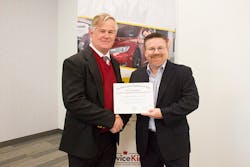In June, an executive order was signed by the White House to promote the growth of apprenticeship programs across the U.S. In December, Service King officially received certification for its Apprenticeship Development Program from the Department of Labor (DOL), making it the first apprenticeship program in the collision repair industry to receive such recognition.
The official signing ceremony was held on December 21 at Service King’s National Support Center in Richardson, Texas. Tyra Bremer, vice president of talent development at Service King, attended the ceremony and said that it was “heartwarming” and “exceeded her expectations.”
Bremer, who spoke with the MSO Project back in March of 2017, says that since the time of that interview, the program has grown to 42 locations with over 100 graduates in the workforce. After such a successful end to 2017, Bremer says the program shows no signs of slowing down and with the additional funding and notoriety that comes along with the recognition, she’s excited to see continued growth in 2018.
How has the apprenticeship program grown since it launched in 2015?
We’ve seen enhanced relationships with the schools as something that’s really evolved over the last couple of years. In the beginning, it was up to us to get out there and educate the schools and the parents and really champion the benefits of the program. Now that we’ve had graduates and seen successful body shop technicians enter the workforce, we have schools coming to us. The schools are now taking a proactive role in educating the parents on the benefit of not only pursuing this as a career, but also what happens after they graduate from our program.
Being officially registered by the DOL sounds significant, but what exactly does that mean?
It means a couple of different things. Because we’re certified, Service King is now eligible to receive educational and workforce funds. This allows us to reinvest money into the growth of our program. From an organizational perspective, the Apprenticeship Program is not a low-cost investment, so getting the support of these additional funds allows us to invest more in growing the program and allows us to continue to promote more opportunities in the industry and be able to bring in more new talent. The other piece is that it brings more credibility to our program. Ultimately, we’re all about providing the best training experience for aspiring body technicians. For Service King, it’s another feather in our cap and it’s also a boost for our industry as a whole as far as promoting opportunities for this field.
How do you plan on leveraging this credibility?
I think from an industry perspective, many parents aren’t aware what a lucrative and rewarding career the trade holds for their children. I think this certification will bring more awareness to careers in the collision repair industry and parents will start to see it as a good choice for any of their children that may not want to pursue a four-year degree.
Service King is the first in the collision repair industry to have an apprenticeship program recognized; how did you bring it to the DOL’s attention?
There were quite a few steps. It took a team of Service King teammates to help us through this process. It began with going out and doing a lot of research and finding the right contacts within the DOL. Especially with the new act that was signed, the government is very interested and there are a lot of people invested in the success of this executive order. Once we were in contact with the right people, they were very accommodating. However, it was a lot of paperwork and it took an entire team to go through it. In addition to the paperwork, it’s vetting the curriculum, vetting the setup and ensuring we have the right verification measures for the program, which we do. Our ultimate goal isn’t just to have a graduate, but to have a graduate that is able to complete quality and safe repairs.
From the DOL’s perspective, they want to make sure that the training provides the students with the quality skills and competencies to be successful and confident enough to be safe in their field. We did have to go through a lot, but the DOL also invested a lot of their own time because they wanted to approve us. It’s not just them wanting to build a program, they want to make sure that they’re certifying the right programs.
What kind of information did you have to provide to the DOL?
We had to provide a great deal of information regarding the curriculum itself and show the percentage of time spent doing certain things. For example, the percentage of time students were in the classroom, doing hands-on work and pursuing continuing education credits. Even though Service King is the owner and facilitator of the Apprenticeship Program, we require students to get I-CAR certifications while they are in the program. The DOL made sure that we required outside continuing education credits. They wanted to make sure that we had the right steps in place to verify the knowledge the students were receiving so that when they do graduate, they had the skills and competency to complete safe and accurate repairs.
Were there minimum requirements to become certified?
Yes. Based on the industry, there are different requirements. So, the same percentage allocation for time spent doing certain things may be different for the collision repair industry than for the manufacturing industry, for instance. There was an entire list of qualifications that we had that we had to meet at a minimum. The great thing was, we met every one of those qualification without having to make any changes to our program. We didn’t build the program with this in mind, so that was phenomenal.
What do you have in mind in 2018 as far as furthering the program?
With the additional government support, our plan is to continue to bring on new graduates and refill classes in 2018. We should have 150 new apprentices starting in 2018. Our goal is to continue to add and add and add.
What advice do you have for other shops that are setting up an apprenticeship program?
First, make sure that you have a solid relationship with surrounding colleges, vocational schools and technical schools in your area. Next, make sure that you have a truly structured curriculum and that it contains different types of learning. It should have on-the-job training and also include development of personal and professional skills and include classroom-based learning. Our students love the blended learning approach. Lastly, I would recommend looking up your contacts with the DOL in your local area and to get a conversation started. As I mentioned, because of the White House executive order, they’re eager to help all organizations that are in an industry that can facilitate an apprentice-type program. It’s all about getting out there and investing the time in finding the people that will help you.

